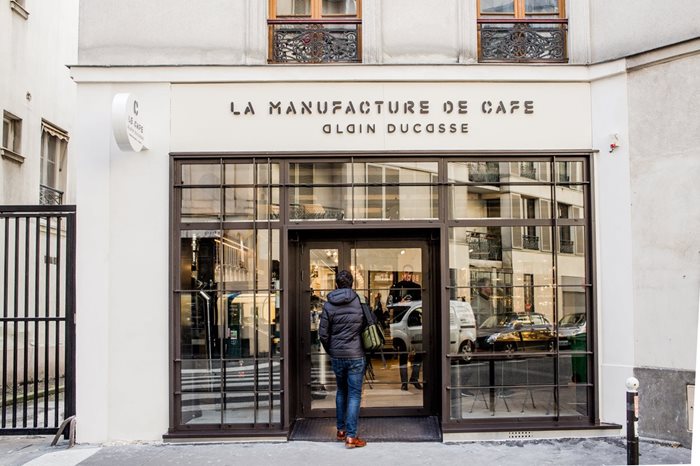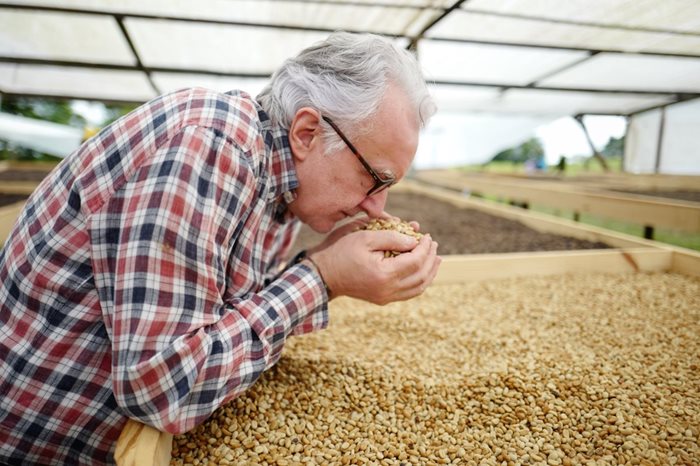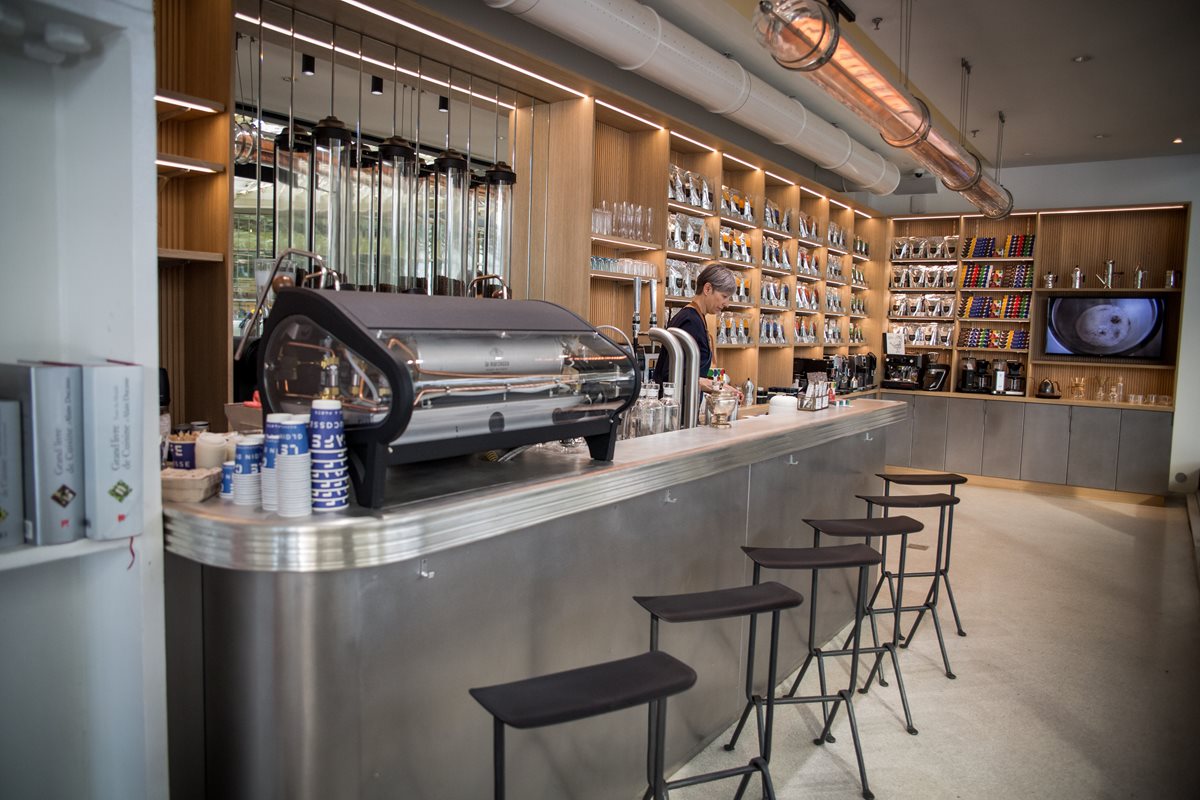Gastronomic superstar Alain Ducasse built a fine dining empire on the simple but powerful premise of interpreting and cultivating the natural beauty of each ingredient served. In February 2020, 5THWAVE Editor-in-Chief and Allegra Group CEO, Jeffrey Young, caught up with the legendary chef and his team to discuss coffee’s ascendance in the fine dining world and beyond
.jpg.aspx?width=700&height=466)
Alain Ducasse (left) pictured with head coffee roaster Veda Viraswami | Photo credit: Pierre Monetta
Culinary legend, acclaimed author, highly successful entrepreneur: the life and career of Alain Ducasse is punctuated by many
exploits extraordinaires. A pupil of gastronomic god and nouvelle cuisine pioneer Alain Chapel, in 1998 Ducasse became the first chef to earn
three Michelin stars twice in the same year.
In 2006, the master cuisinier boldly crossed another frontier by having his culinary creations launched to the International Space Station. In 2007, he rose to new gastronomic heights, taking over the over the Eiffel Tower’s iconic Jules Verne restaurant.
Bettering his previous achievement, in 2009 Ducasse became the first chef to simultaneously own three restaurants with three Michelin stars in three different cities.
With a halo of 20 Michelin stars to his name, Ducasse is the most Michelin-awarded chef in the world today. Among a growing fellowship of
34 restaurants spread across Europe, the Middle East, Asia and the Americas, these accolades attest to Ducasse’s unflinching dedication to cultivating the difference of every ingredient sourced, prepared and served. In this regard, Ducasse considers himself a mere interpreter of origin and flavour, a humble custodian of each ingredient sourced – and coffee is no different.
“Many chefs have not yet realised that coffee is an important frontier to compete on”
“We work with what nature provides to us,” he says. “We are just modest actors in this process, the main show is the origin of the product.”
More recently, the giant of global gastronomy has turned his painstaking methodology to an all-too-often overlooked ingredient in the fine dining world. Coffee, as Ducasse laments, is frequently relegated to the rolling credits of a meal rather than elevated to its triumphant finale.
“Coffee is the final punctuation, the full stop at the end of the meal. It plays into the poetry of the dining experience, but it is often quite randomly chosen and poorly executed,” he says.
When it comes to explaining the gastronomic world’s curious lack of enthusiasm for serving exceptional coffee, Ducasse points to a historical lack of competition, relatively high equipment costs and an absence of knowledge and expertise, even in the highest echelons of the restaurant world.
Moreover, the growing availability of premium coffee systems catering to reliability and consistency makes an off-the-shelf solution even more alluring for busy restaurateurs for whom operating margins matter more than ever.

The La Manufacture de Café roastery in Paris | Photo credit: Pierre Monetta
“Consistency is hugely important when you are serving 300-400 coffees per day. It is not easy at the top level to combine the perfect quantity of resources in harmony. A fine level of detail is required to get the whole proposition right – you need the right flavours, sourcing and processes. One also needs a peaceful mindset to achieve the optimal atmosphere in the room and weave the sensory experience together,” he says.
“But more than simply not paying enough attention to their coffee offer, it is most surprising to me that among the 1,200 best restaurants in the world, around 800 are serving the same coffee. The world’s best chefs strive so hard to be unique and would never execute their culinary experiences in the same way.”
For Ducasse, applying the same rigorous discipline and artistic flare to coffee, as with any other ingredient, proposes a far more holistic fine dining experience. It is also a commercially savvy strategy that swathes of the restaurant world are failing to capitalise on.
In that regard, the legendary chef is way ahead of the game, having invested heavily in coffee expertise, sourcing knowledge and state-of-the-art equipment across all his gastronomic establishments.
“The very best restaurants compete on every element: the food, the interior, the wine list. But why don’t we compete on coffee? Partly because it is not the culture in France and many chefs have not yet realised that coffee is an important frontier to compete on.”
Scaling without compromise
To execute Ducasse’s painstaking artisan methodology at a single site or small group of restaurants would be exceptional, but to successfully scale it across a global gastronomic institution is truly astonishing. Yet this is exactly what Ducasse has achieved across his 34 restaurants, 24 Le Chocolat Alain Ducasse chocolatiers, three Le Café Alain Ducasse coffee shops, three gastronomy education campuses and two country retreats – all spread across 11 countries and three continents.
Whether launching a restaurant, curating a new menu, or creating a new coffee blend, Ducasse explains that each task begins with three fundamental questions: “What have we got? What do we know? And, what are we going to do?” This approach ensures that every element of the group’s proposition is firmly focused on cultivating the unique properties of each ingredient sourced.
Ducasse reiterates that the single most important component behind scaling his internationally acclaimed operation is a “bon casting.”
“We’ve passed the summit of globalisation in cooking as well as coffee”
This means finding the right people for each area of expertise and schooling them through an intensive, long-term immersion in the brand’s artisanal ethos.
To this end, the development of Ducasse’s three Paris
training campuses has been fundamental to the business’ global expansion. “We can only grow as fast as we can develop the quality of our team. Every year we train and educate young chefs. The process is slow and we can only open 2-3 restaurants per year. Embedding culture takes time,” says Ducasse.
Drawing the parallel between
haute couture and
haut cuisine, Ducasse compares each of his global establishments to individual
ateliers de cuisine, or cuisine studios. With Ducasse leading as Creative Director, these gastronomic powerhouses are bestowed with a degree of creative licence, making them malleable to local environments, customs and ingredients, while maintaining the Ducasse DNA firmly at their core.
“The people in charge of our restaurants are given great responsibility. They have grown up with us and are completely embedded when the time comes to take the reins.”
When it came to developing a world-class coffee proposition, the tried and tested methodology was no different. In 2018, Ducasse took a further bold step into the world of coffee, launching the
Le Café Alain Ducasse roastery and coffee shop business in Paris and London.
To manage the development of his new coffee programme, Ducasse appointed Olivier Fellous, who as General Manager was tasked with delivering the stratospherically high standards expected of the Ducasse brand. He also enlisted the expertise of two-time French roasting champion Veda Viraswami to oversee the roasting process and provide coffee training to the team.
As with all Ducasse business activities, developing a new coffee proposition began with a sober, back to basics approach guided by the simple aim to deliver the very finest gastronomic experience in every cup.
“We start by asking what we are going to do with the generosity of nature. We cultivate the different flavours available to us through the roasting process. Coffees from Peru and Vietnam are very different, so we must reveal those unique flavours during the roasting process,” says Fellous.
 Alain Ducasse with Geisha coffee grown at finca Mil Cumbres, Panama | Photo credit: @thefoodalist
Alain Ducasse with Geisha coffee grown at finca Mil Cumbres, Panama | Photo credit: @thefoodalist
To facilitate this concise interpretation, Fellous explains that it was extremely important for the Le Café Alain Ducasse team to fully familiarise themselves with the latest coffee equipment. A lack of equipment appreciation, he says, has been a major pitfall in the French café market, where operators frequently rent espresso machines with little knowledge of proper operation or maintenance, resulting in a compromised product.
Recounting his ongoing explorations in the world of coffee, Ducasse describes his sense of wonder at the depth and range of flavours found in coffee.
“This journey in coffee has been beyond anything I had ever expected. We have been surprised about how much coffee has to offer. The coffee industry contains incredible diversity, from billion dollar companies to tiny smallholder farms and everything between – this is different to other forms of cuisine.”
Among the super premium small batch coffees served at Le Café Alain Ducasse is a Yemini variety grown at 2,300m above sea level, of which just 13kg is harvested per year. With its notes of bergamot, orange, cocoa nibs and grape, capped off with a finish of red berries and honey, it is a coffee that Ducasse has described as “perfect”.
Navigating difficult times
While Ducasse’s coffee programme has been extremely well received, like all tiers of the global hospitality industry, the grand vision has been temporarily disrupted by intermittent store closures as required by Covid-19 lockdowns.
But never one to admit defeat, Ducasse unveiled a radical solution to tackle the thorny challenges posed by social distancing in his restaurants.
In June 2020 Ducasse installed a
high-tech air filtration system to contain the spread of the virus at his Allard restaurant in Paris. The system, invented by designer Patrick Jouin and architect Arnaud Delloye limits the spread of air particles between tables to ensure diners are safe from contracting Covid-19.
At a cost of €50,000, the air filtration system was a sizeable investment, but crucially, it allowed Allard to reopen at 80% capacity at a time when many of the French capital’s dining venues were still forced to close.
Moreover, Ducasse maintains well-equipped restaurants following proper hygiene protocols are likely to be among the safest places to eat during the pandemic.
.jpg.aspx?width=700&height=466)
Interior of Le Café Alain Ducasse Boutique La Canopée, Paris | Photo credit: Pierre Monetta
Globally local
Covid-19 has caused extraordinary upheaval across the world. But the disruption of globalised mass production, until now often perceived as inextricably woven into daily life, offers a generational opportunity to instigate real change in the way we source, prepare and ultimately enjoy food.
Presciently commenting before the global pandemic in February 2020, Ducasse expressed his belief civilisation had reached an important tipping point marking the end of globalisation and a new focus on local products.
“We’ve passed the summit of globalisation in cooking as well as coffee, we’re now going back to a more local way of living.”
In this regard, Ducasse is evangelical that an artisanal, local approach should not be the exclusive preserve of Michelin-starred restaurants, but form the backbone of a new, more sustainable and locally conscious food movement.
For now, the remarkable work of Alain Ducasse provides a glimpse of a world where mindfulness is ingrained into the fabric of every meal. While coffee will remain a fundamentally global product, there is the opportunity for café operators to forge deeper, locally focused connections with coffee producing communities the world over.
By thinking like locals in a global community, we can truly cultivate and celebrate the enormous diversity among the vast cornucopia of ingredients gifted by planet Earth – Vive la différence!
This article was first published in Issue 5 of 5THWAVE magazine
Subscribe to 5THWAVE to receive each edition in print and digitally or sign up to our newsletter and be the first to read the latest articles and updates on World Coffee Portal research